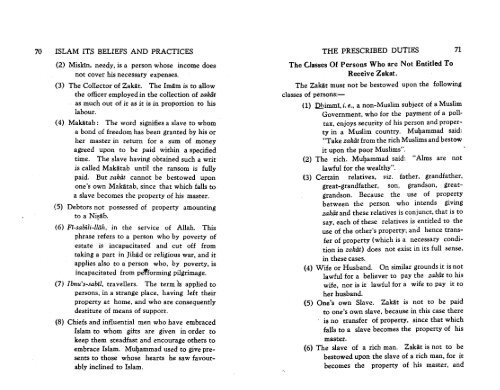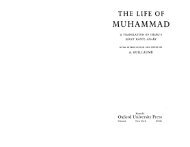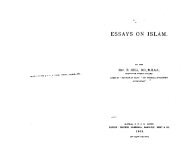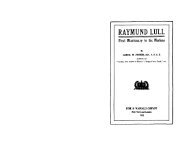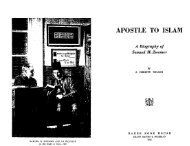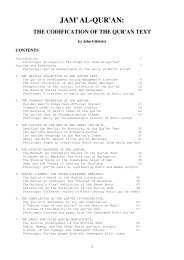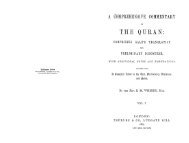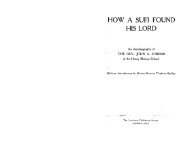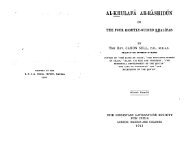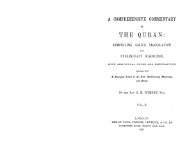Islam Its Belief and Practices - Radical Truth
Islam Its Belief and Practices - Radical Truth
Islam Its Belief and Practices - Radical Truth
You also want an ePaper? Increase the reach of your titles
YUMPU automatically turns print PDFs into web optimized ePapers that Google loves.
70 ISLAM ITS BELIEFS AND PRACTICES THE PRESCRIBED DUTIES 71<br />
(2) Miskin, needy, is a person whose income does<br />
not cover his necessary expenses.<br />
(3) The Collector of Zakat. The Imam is to allow<br />
the officer employed in the collection of zakiit<br />
as much out of it as it is in proportion to his<br />
labour.<br />
(4) Makatab: The word signifies a slave to whom<br />
a bond of freedom has been granted by his or<br />
her master in return for a sum of money<br />
agreed upon to be paid within a specified<br />
time. The slave havinl! obtained such a writ<br />
is called Makatab until the ransom is fully<br />
paid. But zaki3.t cannot be bestowed upon<br />
one's own Makatab, since that which falls to<br />
a slave becomes the property of his master.<br />
(5) Debtors not possessed of property amounting<br />
to a Ni~ab.<br />
(6) Fi-sabili-lliih, in the service of Allah. This<br />
phrase refers to a person who by poverty of<br />
estate is incapacitated <strong>and</strong> cut off from<br />
taking a part in Jihad or religious war. <strong>and</strong> it<br />
applies also to a person who, by poverty. is<br />
incapacitated from pe1forming pilgrimage.<br />
(7) Ibnu's-sabil, travellers. The term 'Is applied to<br />
persons, in a strange place. having left their<br />
property at home, <strong>and</strong> who are consequently<br />
destitute of means of support.<br />
(8) Chiefs <strong>and</strong> influential men who have embraced<br />
<strong>Islam</strong> to whom gifts are given in order to<br />
keep them steadfast <strong>and</strong> encourage others to<br />
embrace <strong>Islam</strong>. Mu1}.ammad used to give presents<br />
to those whose hearts he saw favourably<br />
inclined to <strong>Islam</strong>.<br />
The Classes Of Persons Who are Not Entitled To<br />
Receive Zakat.<br />
The Zakat must not be bestowed upon the following<br />
classes of persons:-<br />
(1) Qbimml, i. e., a non-Muslim subject of a Muslim<br />
Government, who for the payment of a poll.<br />
tax, enjoys security of his person <strong>and</strong> property<br />
in a Muslim country. Mu1}ammad said:<br />
"Take zakiit from the rich Muslims <strong>and</strong> bestow<br />
it upon the poor Muslims".<br />
(2) The rich. MUQammad said: "Alms are not<br />
lawful for the wealthy".<br />
(3) Certain relatives. viz. father. gr<strong>and</strong>father,<br />
great-gr<strong>and</strong>father, son, gr<strong>and</strong>son. greatgr<strong>and</strong>son.<br />
Because the use of property<br />
between the person who intends giving<br />
zakiit <strong>and</strong> these relatives is conjunct. that is to<br />
say, each of these relatives is entitled to the<br />
use of the other's property; <strong>and</strong> hence transfer<br />
of property (which is a necessary condition<br />
in zakiit) does not exist in its full sense.<br />
in these cases.<br />
(4) Wife or Husb<strong>and</strong>. On similar grounds it is not<br />
lawful for a believer to pay the zakiit to his<br />
wife. nor is it lawful for a wife to pay it to<br />
her husb<strong>and</strong>.<br />
(5) One's own Slave. Zakat is not to be paid<br />
to one's own slave, because in this case there<br />
is no transfer of property, since that which<br />
falls to a slave becomes the property of his<br />
master.<br />
(6) The slave of a rich man. Zakat is not to be<br />
bestowed upon the slave of a rich man, for it<br />
becomes the property of his master, <strong>and</strong>


